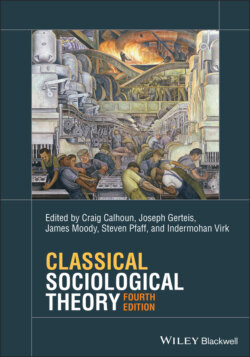Читать книгу Classical Sociological Theory - Группа авторов - Страница 56
Harriet Martineau
ОглавлениеHarriet Martineau was born in Norwich England in 1802 into a well-respected bourgeois family, the sixth of eight children. The family was active in the Unitarian Church and her first writings were anonymous entries into the Unitarian periodical Monthly Repository, focusing on religious activity which she later expanded into a book in 1820. Martineau reported being miserable as a child and painted an unflattering portrait of her mother, describing her as a domestic “tyrant” with little interest in her children’s care and education. She attended a Unitarian girl’s school but was largely self-taught at home through reading and study (as women were barred from university attendance). She struggled with health issues through much of her life, losing her senses of smell and taste early and being nearly deaf much of her life. She never married, though she had a long relationship with Erasmus Darwin (Charles’s older brother). She was ill and largely housebound in the period from 1839 to 1844, where she wrote or started many of her most famous works. After recovering, she designed her house at Ambleside called “The Knoll” where she would spend the rest of her life. She died in 1876 of bronchitis.
Martineau was a prolific author and credited the failure of her family’s business with motivating her to support herself with her writing – no small achievement for a woman of her era. Her first works were short periodical pieces on religion and devotion, which built her reputation for clear and concise writing. Because of family connections to liberal circles, she was then commissioned to write an expository work on Adam Smith called Illustrations of Political Economy (1832). The work was wildly successful at popularizing Smith’s theory and the book sold well, which led to a set of books on similar topics covering liberal social and economic thinkers like J.S. Mill, Jeremy Bentham, David Ricardo and Thomas Malthus. In 1834 she took a two-year trip to the United States which formed the basis of Society in America (1837) and How to Observe: Morals and Manners (1838), the former making substantive and theoretical points while the latter was focused on methodology. Society is largely a critique of America’s failure to live up to its own democratic principles. Where Tocqueville had paid little attention to women, Martineau emphasized the failure of the US to provide them with all rights of citizenship - including voting. Even more strikingly, Martineau called attention to the contradictions tolerating slavery posed to the allegedly free society of the US - and which would soon shape the Civil War. Particularly with regard to the rights of women and for slavery but also espouses a general theoretical vision that linked social understanding to naturalistic principles and a scientific approach to understanding society. Homebound with illness between 1839 and 1844, she wrote four novels, started her autobiography and wrote Life in the Sickroom, which has since been recognized as one of the first works to reverse the power dynamics of patient and caregiver in medical situations with a clear focus on self-reliance and determination. After recovering in 1844 she took a trip to the Middle East which informed her book Eastern Life, Present and Past which reflects on religious topics, taking a much more naturalist and secular turn than her earlier devotional works. In 1848 she wrote Household Education which advocated for improving women’s education, a topic she’ll return to again numerous times in over 1600 articles for the Daily News.
Martineau in her own day was clearly associated with a long and deep liberal strand in British politics (the so-called “Whiggish” tradition) that favored a limited monarchy, gradual democratization, free-market capitalism, and global markets. That tradition was suspicious of government involvement in economy and society and sought to unleash the entrepreneurial and democratic potential of the British people. She was a public proponent of these ideas about economics and social progress. Today, sociologists regard her as a forgotten founder in sociology (Giddens and Griffiths 2006), notable for her endorsement of comparative methods, her keen empirical insights, and her insistence on broadening the argument for social equality from white men to women and people of color. Although she was no social leveler, she consistently advocated for women’s rights and the abolition of slavery. Very much in the Enlightenment tradition, she pushed for a scientific understanding of the social world in keeping with the progress being made in the natural sciences. Martineau was optimistic that liberal principles of social order would enable societies to make economic progress and advance equality.
